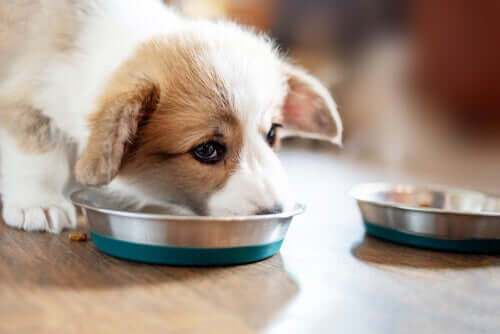Feeding Your New Puppy: The Golden Rules
Proteins, calcium and vitamin D are some of the basic nutrients a puppy needs in order to grow and develop properly.

When it comes to feeding your new puppy, you may have questions about aspects such as quantity, frequency, and how to choose the best type of food. Knowing the basics of puppy nutrition will help ensure proper development, and give them the best possible start to life.
Like all mammals, puppies start by drinking their mother’s milk. In addition to strengthening the bond between the mother and her pups, suckling provides newborns with essential nutrients for growth, and strengthens their immune system. Puppies are weaned at around eight weeks old, when they’ll start eating solid foods.
Very few pet owners see puppies when they’re this young, unless they choose to breed litters of their own. However, it’s important to be aware of just how important this stage is. Weaning and re-homing puppies too early can pose huge risks to their health. Breeders should wait until puppies are at least two (and ideally three) months old before separating them from their mothers.
Feeding your new puppy
Puppies under 8 weeks old will usually alternate between nursing from their mother and eating solid food, before finally switching to solid food completely. At that stage, they will need to eat between four and six meals per day, preferably soft, mushy food.
You’ll need to reduce the number of meals as your puppy gets older. For example, you could start with four meals a day up to the age of three months, three meals a day up to the age of six months, before finally reducing to two meals a day. The portion sizes will depend on the breed and particular needs of each individual animal.
You should find a portion guide on the back of the packet, calculated according to the weight of the puppy. However, it’s always a good idea to ask your vet for advice.

Choosing the right food for your puppy is essential in order to ensure they get all the nutrients they need. Puppy food should have a higher calorie content than adult dog food. As well as promoting development, it’s also designed to give them plenty of energy. Similarly, the protein, vitamin and mineral content is usually higher, particularly when it comes to calcium, magnesium, iron, zinc and vitamin D.
Although canned wet food may seem more palatable and easier to eat than dry food, we wouldn’t recommend letting your puppy get used to eating it on a regular basis. Today, there are plenty of dry foods on the market which are specially designed for a specific breed and age range, with kibble in proportion with the size of the animal.
How to encourage your puppy to eat all its food
When it comes to feeding your new puppy, you may find some resistance, especially in smaller breeds. As such, it’s important to supervise them, and make sure they finish all their food. This can help prevent them from ingesting foreign bodies when your back’s turned.

Establishing a feeding schedule and creating a clean, quiet eating area will give your dog a sense of routine. If they haven’t finished all their food, you can use games and toys to encourage them to eat.
To do this, however, you need to resist the temptation to feed them scraps or leftovers. In fact, it’s better to choose a different type of food or alternate between wet and dry food than to spoil and mollycoddle them early on.
When it comes to exercising your puppy, experts recommend that you wait at least an hour after they’ve finished eating to allow them to digest their food properly. That way, you can avoid stomach problems such as bloating and gastric torsion. This is especially important when it comes to large and giant dog breeds.
In conclusion, the golden rules for feeding your new puppy include gradually altering the number of meals as they get older, consistently making sure they eat all their food, and choosing a high-quality puppy food. Making nutrition a priority early on will have a hugely positive impact on your pet later in life.

